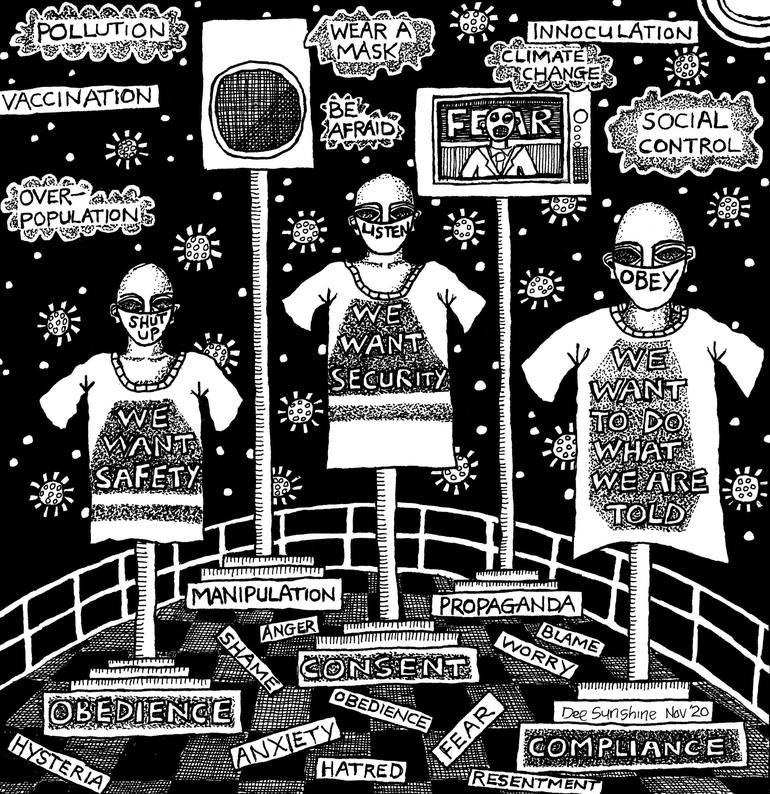Picture this: you wake up, your smart home adjusts the temperature and plays your favorite playlist based on your sleep patterns. You head to work, a system predicts traffic and suggests the best route. When you’re shopping, personalized ads flash across your screen, seemingly curated to your exact needs. This might sound like a futuristic novel, but it’s becoming everyday reality. These seemingly convenient technologies are interwoven with powerful algorithms that shape and influence our choices, subtly directing our behavior in ways we may not even realize. This is societal control in the 21st century – a complex tapestry of technological advancements, social structures, and psychological forces.

Image: cosmopublications.com
The concept of societal control, however, isn’t new. Throughout history, societies have sought ways to maintain order, shape behavior, and enforce norms. Whether it’s through religious doctrines, legal systems, or social pressures, societal control has been a constant in human civilization. But with the rise of the digital age, the mechanisms and implications of control have taken on a new dimension.
The Evolving Nature of Societal Control
For centuries, societal control was primarily exerted through physical and social means. Laws, social institutions, and religious beliefs set the boundaries of acceptable behavior. Individuals who deviated faced consequences, often through legal repercussions, social ostracism, or even physical punishment. This system of control was direct and tangible, leaving little room for ambiguity.
With the advent of the internet and the rise of big data, society has witnessed a shift towards a more nuanced form of control. The digital domain provides an unprecedented platform for data collection and analysis. Social media platforms, search engines, and online shopping websites meticulously track user behavior, preferences, and interactions. These vast datasets are used to build predictive models, personalize content, and tailor experiences, shaping how individuals perceive the world and make decisions.
Understanding the Mechanisms
Societal control, in its modern form, manifests through various mechanisms. Here’s a closer look at some of the key players:
1. Algorithmic Control
Algorithms are at the heart of this digital revolution. They power everything from search results and social media feeds to online recommendations and personalized advertising. These algorithms, often complex and opaque, use our data to predict our behavior, manipulate our perceptions, and guide our choices. For instance, the algorithms used by social media platforms can tailor our newsfeeds to reinforce existing beliefs, creating echo chambers and limiting exposure to diverse viewpoints.

Image: www.saatchiart.com
2. Surveillance Technologies
The ubiquity of surveillance technologies has dramatically changed the landscape of societal control. From CCTV cameras to facial recognition software, these technologies are capable of monitoring our movements, recording our interactions, and even predicting potential threats. While these technologies can contribute to public safety, their unchecked deployment raises concerns about privacy violations, discriminatory practices, and the potential for authoritarianism.
3. Social Media Influence
Social media has become a powerful tool for shaping public opinion and influencing behavior. Social media influencers, with their massive followings, can promote brands, spread ideologies, and even affect election outcomes. The persuasive power of social media, combined with the targeted algorithms used by these platforms, can manipulate our perceptions and influence our actions in ways that we may not fully understand.
4. Psychological Manipulation
The use of psychological principles in advertising and marketing has long been a part of societal control. The rise of behavioral economics has further refined these techniques, using our cognitive biases and emotional vulnerabilities to influence our choices. For instance, the use of scarcity tactics in online shopping nudges us to make impulsive purchases, while the use of social proof can make us more susceptible to peer pressure and herd mentality.
The Implications of Societal Control
The evolving nature of societal control raises profound questions about our freedoms, our autonomy, and the very nature of our society. Here are some key considerations:
1. Erosion of Privacy
The constant collection and analysis of our personal data raises serious concerns about privacy. Our online footprints, once considered private, are now readily accessible to corporations and governments, potentially leading to misuse or abuse.
2. Manipulation and Bias
The algorithms that power our digital lives are often designed to maximize engagement and profits, potentially leading to the manipulation and reinforcement of existing biases. This can result in echo chambers, filter bubbles, and a distorted view of the world.
3. Social Control and Inequality
The concentration of power in the hands of tech giants and governments raises concerns about social control and inequality. The ability to influence information flow, manipulate online discourse, and control access to essential services can have significant societal implications, potentially reinforcing existing power dynamics and widening societal divides.
Navigating the Future
In a world increasingly shaped by societal control, it’s vital to engage in critical thinking and proactive measures to protect our autonomy and promote a more equitable society. Here are some tips to consider:
1. Be Mindful of Your Digital Footprint
Be aware of the data you share online and exercise caution when using social media platforms. Utilize privacy settings, consider using privacy-enhancing tools, and be selective about the information you disclose.
2. Cultivate Critical Thinking Skills
Question the information you encounter online, verify sources, and be skeptical of claims that seem too good to be true. Engage in diverse perspectives and seek out information from reputable sources.
3. Advocate for Digital Rights
Support organizations that champion digital rights and privacy. Stay informed about regulations and policies governing data collection and online behavior.
FAQs about Societal Control
Q: What is the difference between societal control and government control?
A: Societal control refers to the broader mechanisms that shape individual behavior and social norms, often involving both formal and informal institutions. Government control is a subset of this, exercising power through laws, regulations, and enforcement mechanisms.
Q: Are there any benefits to societal control?
A: Societal control can provide societal order, protect individual rights, and promote safety and well-being. However, it’s crucial to ensure that these benefits are not achieved at the expense of individual freedoms or through discriminatory practices.
Q: What steps are being taken to regulate societal control?
A: Governments and international organizations are increasingly focusing on regulations related to data privacy, algorithmic fairness, and the ethical use of surveillance technologies. However, the rapid pace of technological development often outpaces regulatory efforts.
Societal Control
Conclusion
Societal control is a complex and evolving phenomenon that raises significant questions about our freedoms, our autonomy, and the future of our society. It’s crucial to be aware of the mechanisms of control, to exercise critical thinking, and to advocate for policies that promote a more equitable and just digital world. Are you concerned about the implications of societal control? What steps, if any, are you taking to protect your privacy and autonomy online?





